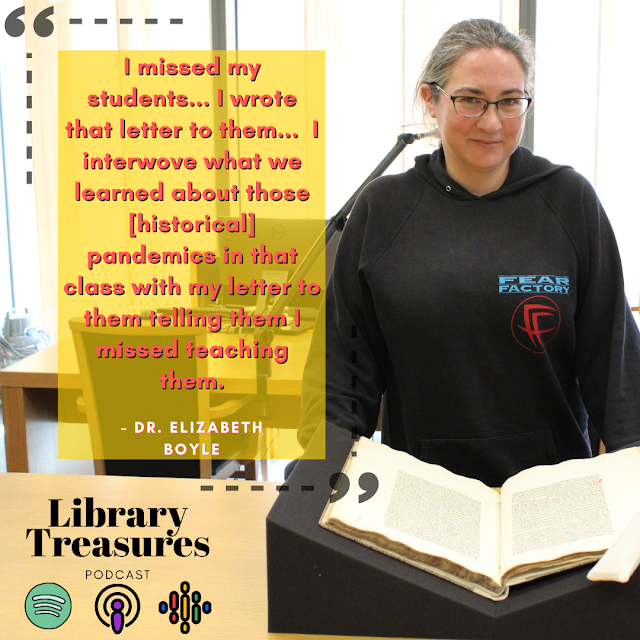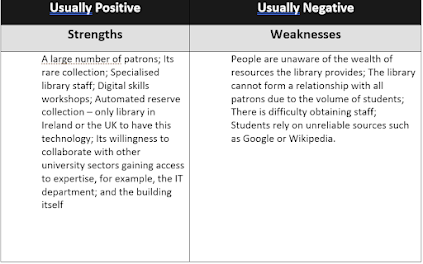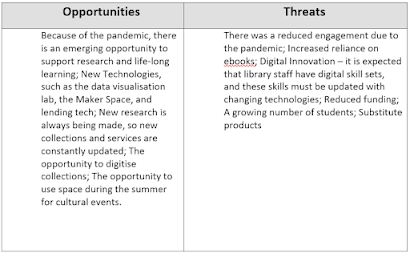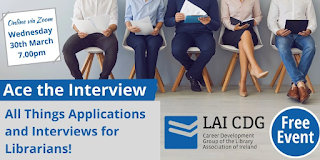.JPG) |
| © True Media |
Guest Post by Sinead Delaney Sinéad is a student of Library and Information Management. She has recently completed a work experience placement at the Glucksman Library.'
I am a Master’s student in Information and Library Management at Ulster University. The course is part-time and entirely remote. One of the conditions of the course is that I must work in a library setting as I study. This blog post and the poster I present at the CONUL Conference in May 2022 recount my experience of conducting a virtual work placement at UL. While the latter stages of my placement were in-person, I worked entirely remotely for the autumn semester of 2021 as the Covid-19 restrictions in place in September 2021 meant that only University staff and students were permitted in UL Library.
When I enrolled on my course at Ulster University, I was working full-time, first at a HSE Covid-19 Vaccination Centre in Laois, then at the library supply department in O’Mahony’s Booksellers in Limerick city. I began my work experience in UL in September 2021, which meant my placement began during the pandemic. The Glucksman Library allowed me to conduct my placement virtually, and my academic supervisor also supported this. While doing my virtual work placement at the Glucksman Library I worked on projects for my supervisor, Michelle Breen and for Louise O’Shea, Librarian Administration. Below are some of the projects I worked on for UL Library.
Digital Skills Workshops
I attended UL’s 21 Digital Skills for Students workshops (online) and prepared a report on how I perceived them, being a postgraduate student myself. I reported my observations under the following headings so that the LevUL Up project team at UL could get qualitative feedback on the following:
- Applicability,
- Volume of content,
- Pace,
- Level of interaction,
- Level of understanding as measured by questions asked.
I also did a landscape check for Michelle, finding out the different types of classes that libraries in Ireland, the UK and the US offer to their students. Michelle will mention this in her talk at the CONUL Conference on ‘Taking a Lead in Digital Literacy’
Research Skills
When doing desk-based research for Michelle, and also for Louise O’Shea I was able to carry out research projects from start to finish and present my findings through a Powerpoint deck; a simulation of the type of assignment I might face in my course, and a taste of what it could be like to work at an academic library. For Louise, I looked at the Universities that have Makerspaces to see how common it was that these were managed by the University library. I also audited the University libraries to see what technology they loaned to students and reported my findings back to the librarians. This meant I learnt about what these sorts of spaces looked like and understood the types of equipment that were useful for libraries to lend.
New skills for students
Michelle encouraged me to think like a student when attending the digital skils workshops but challenged me to think like a teaching librarian too when I presented my findings about the types of workshops presented in other libraries. I identified that there was nowhere really teaching reading skills so I prepared a PowerPoint presentation on critical reading skills aimed at postgraduates. I was able to apply principles I had come across in my studies, for example, ‘fitting-in’ reading and ‘analytical reading. I hope that UL will be able to make some use out of my work on this in the future in their workshops for students.
Collection Development
During my virtual work placement, I submitted a list of recommended new titles for the popular fiction section in UL’s Glucksman Library. To do this, I consulted best seller lists, compared what UL had already in stock and also used social media sites to come up with my list of books.
SWOT Analysis
I completed a SWOT analysis of the library as part of a college assignment and Michelle’s feedback to me on that was that it matched what an academic library would identify among its strengths, weaknesses, threats and opportunities in the current climate
Reflections on my virtual work placement
I am an alumnus of the University of Limerick and immediately felt a connection to the library when I began my work placement. Since January 2022 I have been able to actually come in to the library and that has highlighted for me the importance of being face-to-face with colleagues. The remote working part of my placement, while not ideal, meant that I was in a safe working environment and I didn’t really feel disconnected from the library team.
I had weekly virtual meetings with my supervisor, Michelle Breen, Head of Information Services during my placement. Often these were taken during my work break but I made it work.
Overall, my placement was a success. I received a great insight into library work and was able to make real contributions to the library. I had to manage my time carefully with a full-time job, a part-time internship, and a part-time Master’s.
Where to next?
My background before September 2021 was not in library science. I completed an undergraduate degree in Food Science and Health at the University of Limerick before completing the professional exams with Chartered Accountants Ireland. I found the skillset I had already developed applicable to the library sector. A methodical approach to tasks was invaluable, and being good at Microsoft Office, especially Excel, is very important. Being digitally literate is an essential part of working in a library and I was glad to be able to use Excel, Powerpoint and Canva during my placement. My course will take another 2 years and I look forward then, or before I complete it, to working in a library.
I am grateful to the staff at the Glucksman Library in UL for welcoming me in to their team and especially grateful to Michelle Breen and the other managers in UL for being so flexible in their approach and accommodating me getting started through this work placement.
Come and see my poster with Michelle at the CONUL Conference in Limerick.


.jpeg)

.jpeg)
.JPG)





